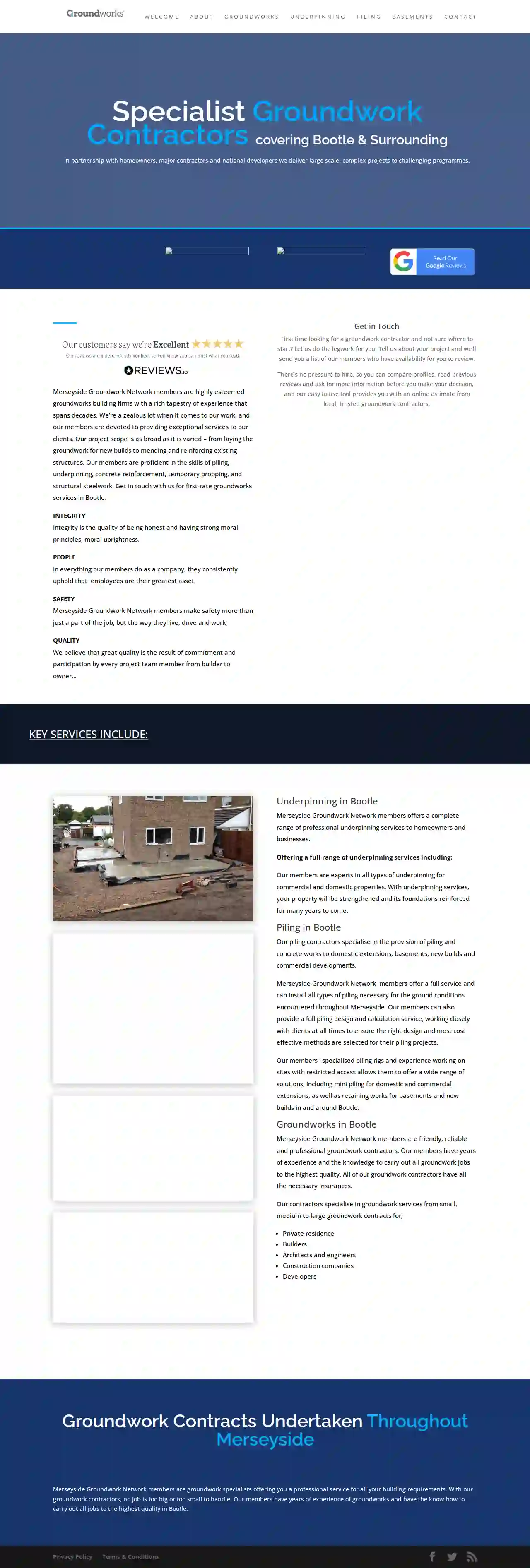Excavation Contractors Lydiate
Find the best Excavating Contractors in Lydiate
Receive multiple Excavation Company Near Me quotes for your project today! Compare profiles, reviews, accreditations, portfolio, etc... and choose the best offer.

Buller Driveways
34 Old Farm Road, Crosby, Liverpool, L23 2RZ, GBWelcome to Buller Driveways Welcome to Buller Driveways. We have been constructing stunning driveways and patio areas for our clients across the North West for over two decades. We work with you to ensure the process is kept easy from planning to building. Why We Are Different Buller Driveways focuses on key areas that are expected and searched for by our clients: Timekeeping, presentation, affordability and expertise are all areas of our work that we aim to excel in, to ensure that our clients get a flawless experience. How We Help We aim to make what can be a daunting process of getting a new driveway an easy and enjoyable one! From free no obligation quotes to on site surveys and consultations. Every measure is taken to ensure your next project with us runs flawlessly. Ensuring A 5 Star Service Here at Buller Driveways we aim to offer anyone and everyone who uses us a complete five star service. No matter how much you spend or how big your project is. You can rest easy knowing that we strive to provide every customer with the bespoke driveway service that they deserve.
- Services
- Why Us?
- Testimonials
- Gallery
Get Quote
L.E.L Civils LTD
53 reviewsStopgate Lane, Simonswood, Liverpool, L33 4YD, GBWelcome to L.E.L Civils LTD LIVERPOOL GRABS, TIPPERS & Aggregates Get in Touch About Us Grabs & Tippers Suppliers of Aggregates As a registered waste carrier, L.E.L Civils provide a fleet of Grab Wagons & Tippers throughout the North West. One of the many services we provide is the removal and disposal of soils, clay, hardcore and green waste all disposed of at our licenced tip. Suppliers of Aggregates Suppliers of Aggregates We also supply a range of aggregates and commercial topsoil, including recycled/quarried, MOT stone, crushed brick, grit /building sand, different sizes of clean stones, pipe bedding Trusted & Experienced Hardcore Tipping Facilities Our management staff and operators hold over 40 years of experience in the Civils and Groundwork sector and can ensure your every need will be catered for, with unbeatable prices. Hardcore Tipping Facilities Hardcore Tipping Facilities Here at LEL civil we act ethically to ensure we do our bit for the environment. Which is why we endeavour to recycle our waste when possible and to dispose the rest safely.
- Services
- Why Us?
- Gallery
Get Quote
The Oakwood Group
11 reviewsSwitch House, Northern Perimeter Road, Liverpool, L30 7PT, GBAbout Oakwood Oakwood is an established property development company specializing in the creation of high-quality new homes in prime locations across Lancashire, Cheshire, Merseyside, and Greater Manchester. Operating as a privately-owned family-run business, Oakwood's management team draws on decades of construction and homebuilding expertise to provide homes built to the highest standards, complementing their surroundings and perfectly matching the living and lifestyles of modern purchasers. Design and build quality are at the forefront of our thinking. We are passionate about what we do, and the success of our developments is a testament to that. In addition to building homes that suit today's lifestyles, we implement efficient processes and tight quality controls to ensure we finish every home on time and to exacting standards. Our experienced construction team strives to ensure the highest standard of craftsmanship and uses only the best quality materials to build your new home. We carry out regular training to refresh our skills and make sure we're always up to date with the latest build methods. Each new home goes through the Key Stage Building Control inspections plus our own rigorous checks at continuous stages of the construction process. We only work with proven bona fide local subcontractors, promoting local business and ensuring the highest standard of build quality. We keep to strict standards of workmanship, materials, and safety, and we expect the same from our partners. While we've spent years developing sound relationships with the best local subcontractors and suppliers, we're always reviewing our construction partners and supply chain base to see where we can improve. Oakwood is a registered provider of the Government's Help To Buy scheme, which helps first-time buyers take their first steps onto the property ladder.
- Services
- Why Us?
- Testimonials
- Gallery
Get Quote
L and S Groundworks
Bootle, GBMerseyside Groundwork Network: Your Trusted Groundwork Partner in Bootle Merseyside Groundwork Network is a collective of highly skilled and experienced groundwork contractors serving Bootle and the surrounding areas. We are dedicated to delivering exceptional services to homeowners, major contractors, and national developers, ensuring that every project, no matter how complex, is completed to the highest standards. Our members are experts in a wide range of groundwork services, including: Underpinning Piling Concrete reinforcement Temporary propping Structural steelwork We are committed to: Integrity: We uphold the highest ethical standards in all our operations. People: We recognize our employees as our most valuable asset. Safety: Safety is paramount in everything we do. Quality: We strive for excellence in every project, ensuring the satisfaction of our clients. Whether you're planning a new build, an extension, or need to reinforce an existing structure, our members have the expertise and experience to handle your project with precision and care. Contact us today for a free consultation and let us help you bring your vision to life.
- Services
- Why Us?
- Gallery
Get Quote
Aggregate Industries Liverpool - Asphalt Plant
4.114 reviewsBootle, GB- Services
- Why Us?
Get Quote- St
SticX
51 reviewsBootle, GB- Services
- Why Us?
Get Quote - Al
Alfie Johnson (Groundworks) Ltd
53 reviewsBootle, GB- Services
- Why Us?
Get Quote - Se
Sefton Surfacing
51 reviewsBootle, GB- Services
- Why Us?
Get Quote - O’
O’Donnell Groundworks Ltd
Bootle, GB- Services
- Why Us?
Get Quote - As
Asbestos Removal Bootle Ltd
51 reviewsBootle, GB- Services
- Why Us?
Get Quote
Over 13,059+ Excavation Contractors on our directory
Our excavation contractors operate in Lydiate & surroundings!
ExcavationHQ has curated and vetted Top Excavation Contractors in Lydiate. Find a reliable pro today.
Frequently Asked Questions About Excavation Contractors
- Hauling to Designated Disposal Sites: Transporting excavated material to approved landfills or recycling centers.
- Recycling or Reuse: If suitable, some excavated soil might be recycled for other projects or reused on-site for landscaping or backfilling.
- Complying with Regulations: Adhering to local and environmental regulations for soil disposal to prevent contamination or illegal dumping.
- Basement Size: The larger the basement, the more excavation is required, increasing the cost.
- Soil Type: Excavating rocky or dense clay soil is generally more expensive than loose soil.
- Accessibility: Difficult-to-access sites might require specialized equipment or more labor, driving up costs.
- Foundation Type: The chosen foundation type (full basement, crawl space, slab) affects excavation needs.
- Underpinning: If underpinning (strengthening existing foundations) is necessary, it significantly increases costs.
- Disposal Fees: Hauling excavated soil to disposal sites adds to the overall expense.
- New Construction: Laying foundations, basements, or underground utilities for new buildings.
- Home Additions: Creating space for new rooms, basements, or extensions.
- Landscaping: Leveling ground, creating slopes, installing retaining walls, or digging for ponds or pools.
- Drainage Improvement: Installing French drains, drainage ditches, or swales to manage water runoff.
- Utility Installation or Repair: Laying new water, sewer, gas, or electrical lines, or repairing existing ones.
- Demolition: Clearing debris and preparing the site after demolishing a structure.
How do you handle soil disposal after excavation?
What is the difference between cut and fill excavation?
Cut: Involves excavating soil from an area where the existing grade is higher than the desired grade.
Fill: Refers to using the excavated soil ('cut' material) to raise the grade in an area where the existing grade is lower than desired.
This method minimizes the need to import or export soil, reducing costs and environmental impact. It's commonly used for site preparation, road construction, and landscaping.
How much does it cost to excavate a basement?
How do I know if I need excavation for my project?
How do you handle soil disposal after excavation?
- Hauling to Designated Disposal Sites: Transporting excavated material to approved landfills or recycling centers.
- Recycling or Reuse: If suitable, some excavated soil might be recycled for other projects or reused on-site for landscaping or backfilling.
- Complying with Regulations: Adhering to local and environmental regulations for soil disposal to prevent contamination or illegal dumping.
What is the difference between cut and fill excavation?
Cut: Involves excavating soil from an area where the existing grade is higher than the desired grade.
Fill: Refers to using the excavated soil ('cut' material) to raise the grade in an area where the existing grade is lower than desired.
This method minimizes the need to import or export soil, reducing costs and environmental impact. It's commonly used for site preparation, road construction, and landscaping.
How much does it cost to excavate a basement?
- Basement Size: The larger the basement, the more excavation is required, increasing the cost.
- Soil Type: Excavating rocky or dense clay soil is generally more expensive than loose soil.
- Accessibility: Difficult-to-access sites might require specialized equipment or more labor, driving up costs.
- Foundation Type: The chosen foundation type (full basement, crawl space, slab) affects excavation needs.
- Underpinning: If underpinning (strengthening existing foundations) is necessary, it significantly increases costs.
- Disposal Fees: Hauling excavated soil to disposal sites adds to the overall expense.
How do I know if I need excavation for my project?
- New Construction: Laying foundations, basements, or underground utilities for new buildings.
- Home Additions: Creating space for new rooms, basements, or extensions.
- Landscaping: Leveling ground, creating slopes, installing retaining walls, or digging for ponds or pools.
- Drainage Improvement: Installing French drains, drainage ditches, or swales to manage water runoff.
- Utility Installation or Repair: Laying new water, sewer, gas, or electrical lines, or repairing existing ones.
- Demolition: Clearing debris and preparing the site after demolishing a structure.